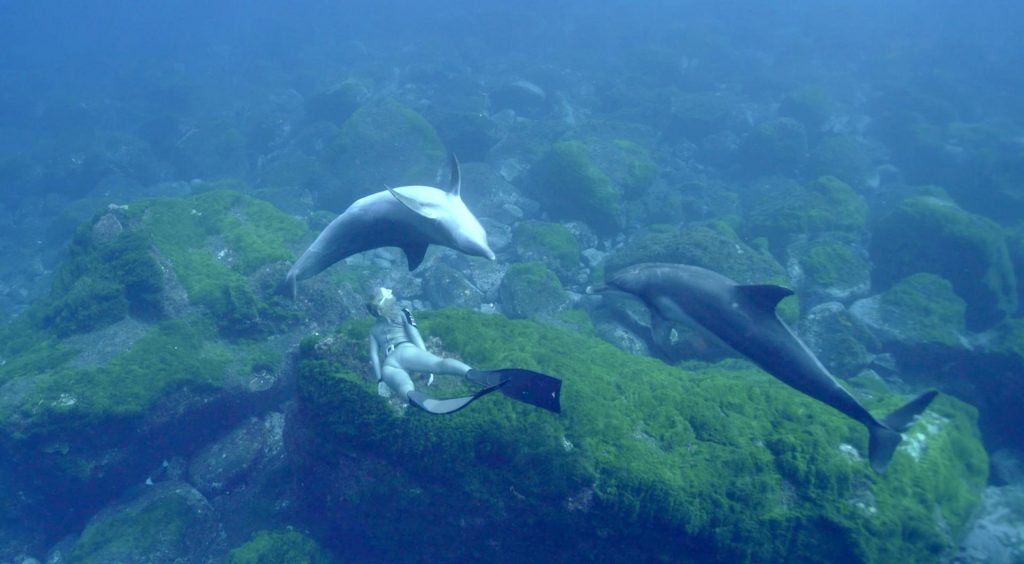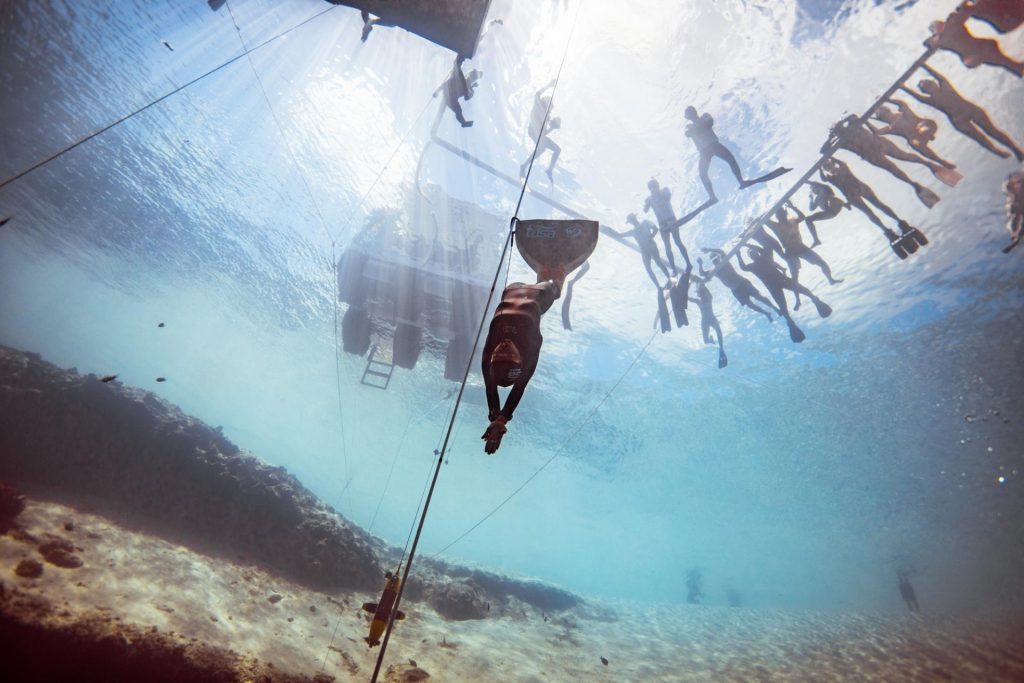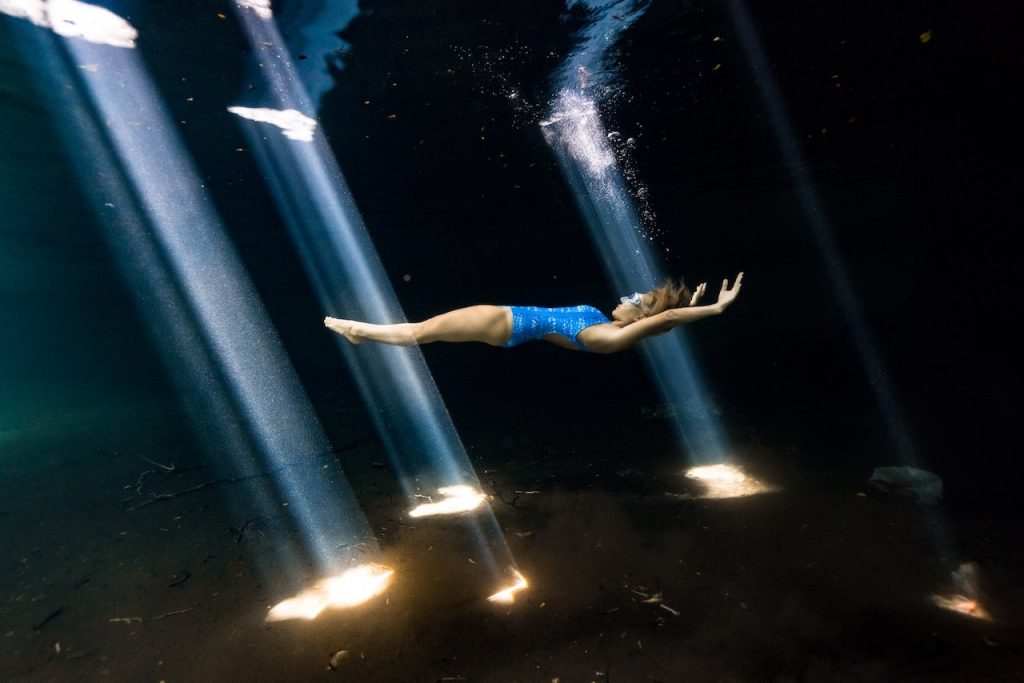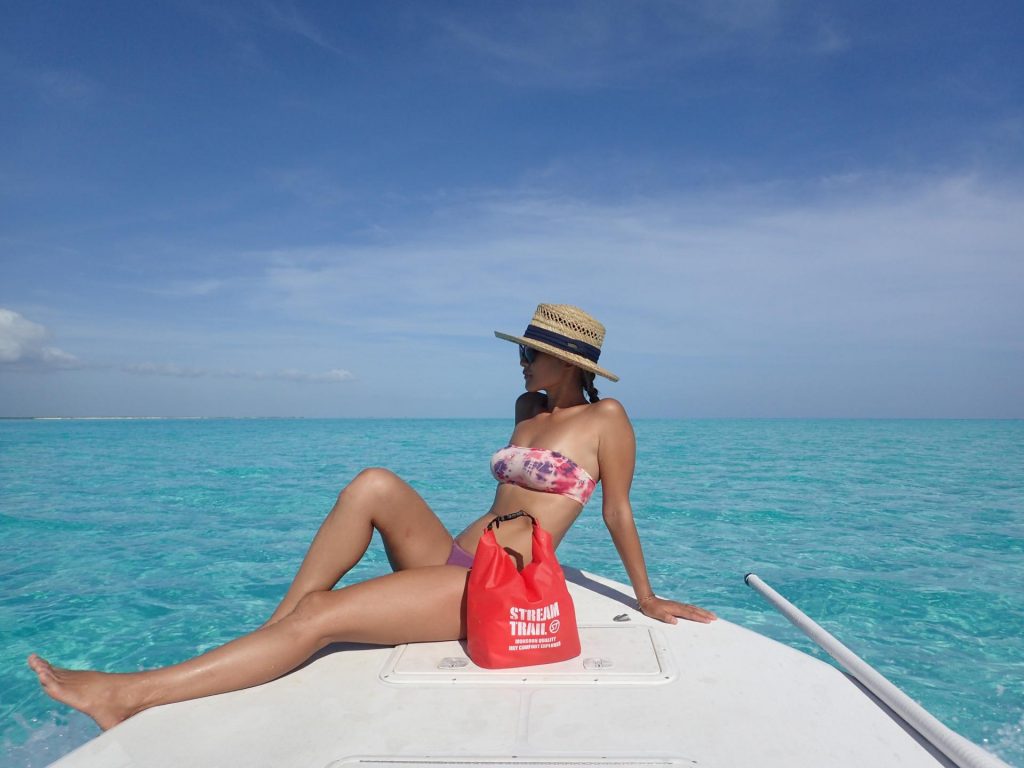“One hundred meters…and touch down!” Cheers erupt as Hanako Hirose grabs a tag from the hundred-meter mark deep below the turquoise Bahama waters. The petite 33-year-old with her signature platinum blonde hair broke the world record in 2017—and 2018—at the women’s Vertical Blue competition hosted by Association Internationale pour le Développement de l’Apnée (AIDA), the world free diving association. She’s not only Japan’s top female freediver, she also holds a record for holding her breath for an impressive seven minutes and three seconds.
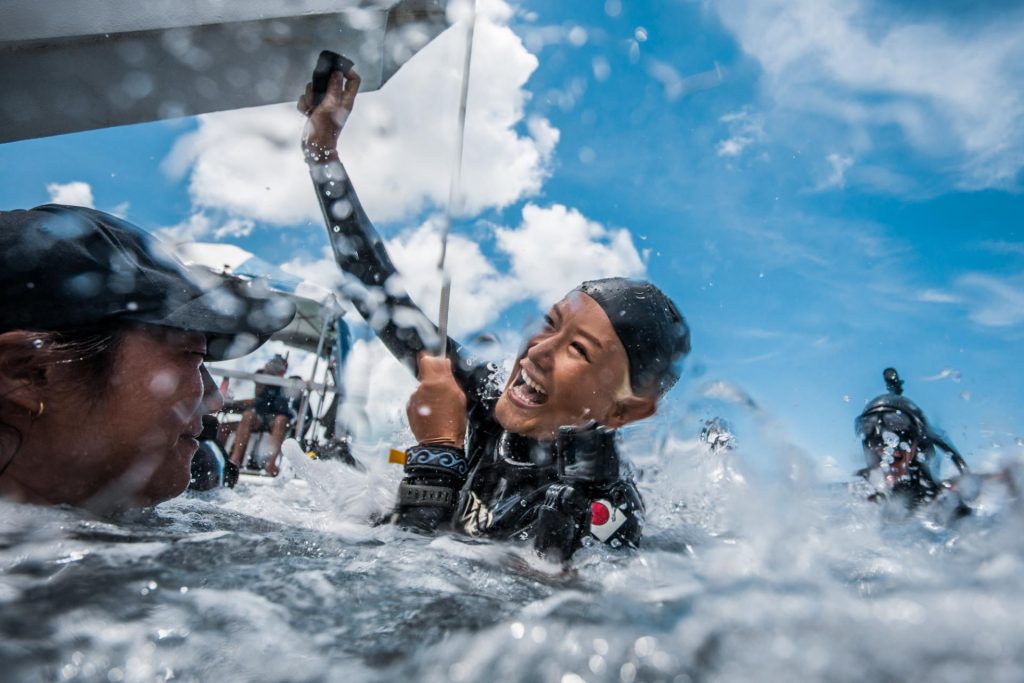
Photo by Alex St. Jean
While she’s not diving into the abyss she’s spreading awareness in Japan about this sport. Outdoor Japan caught up with her while she was back in her hometown in Chiba, training for her next big competition.
Rie Miyoshi: You were born on Tokyo’s outer islands, do most people dive there?
Hanako Hirose: Yes, my dad is from Mikurajima, you’ve probably heard of the island because it’s famous for dolphin swimming. My family lived there until I was around two or three then we moved to Urayasu City on the mainland, but I went back to the island to visit my grandparents a lot.
You’d actually be surprised—in Japan, locals who live really close to the water don’t swim much. When they do, it’s for functional purposes. For example, my dad and grandma used to dive for shellfish and fish to eat.

Photo by Go Hayakata
RM: Did your childhood in Mikurajima affect your decision to become a professional freediver?
HH: For sure. Mikurajima is very small, around 300 residents, and a lot of my relatives live there. One of them owned a dolphin tour boat so he’d bring me along. I’ve been swimming with dolphins since I was in elementary school. I loved everything about the ocean: diving, swimming with dolphins and just being in the water.
As I kept swimming, I wanted to see what my limits were and challenge myself to dive deeper. I was particularly inspired by the movie “The Big Blue” which opened my eyes to the freediving world. During my second year of high school, I signed up for a short two-day freediving course in Izu. That’s around the time I determined that one day I was going to break the world record for freediving.

Photo by Alex St. Jean
RM: Have you been competing professionally since then?
HH: After high school I enrolled in vocational school for scuba diving. At that time, there weren’t many professional freediving associations or schools in Japan, so I went to scuba diving school. But I didn’t want to become a scuba diving instructor. I almost didn’t complete my degree, but my teacher urged me to graduate, then after that I could work as a freediver at his dive shop in Chiba, True North. That was the start of my freediving career. It’s also where I met my husband; he’s the manager there.
RM: When did you break the world record?
HH: I reached 103 meters during the Vertical Blue 2017 competition in the Bahamas. Unfortunately the next day my rival, a girl from Italy, broke that record. The next year I reached 106 meters. The Italian freediver broke that record the next day too! So for 2020 I want to break the top record again and am working on training the muscles needed to dive deeper.
I train in the pool through winter until March or April. When it gets warmer I head south to Amami Oshima. I’m trying to establish a community there now as freediving is still very new. There aren’t many places to practice deep water freediving in Japan so I usually go to the Philippines, or the Bahamas, to practice a month before the competition.
RM: Does your family support your freediving career?
HH: Each time before a competition my parents tell me to be careful. There’s an underwater camera that follows the divers down so you can watch the competition live from overseas. I want my parents and husband to watch me but they always tell me they’re too scared to watch so they’ll check out the recaps (laughs).
RM: You look really calm when diving. What’s going on inside your mind?
HH: I don’t really think a lot when I dive. There’s a point where the ocean just draws you in—it usually happens between 20 to 40 meters depending on your body weight—and it’s called “free fall.” It’s complete relaxation as I close my eyes and stay calm and focused. I’m not even kicking anymore because I’m just falling. I turn off all my thoughts and emotions and become part of the ocean. It’s a really comfortable feeling.

Photo by Daan Verhoevern
RM: I think most people might panic at that point—do you have advice for those interested in freediving?
HH: Of course there are the technical aspects of freediving, but the most important part I stress is understanding your body and how it relaxes. It’s so important to be in the right mindset. When my 106-meter record was broken in 2018, I rushed to break it again the next day. Because I was stressed and pushed myself in the wrong way, I blacked out while diving, which immediately counts against your race. A major part of freediving is to relax and let go. When you’re able to do that, it’s easier to hold your breath for longer periods underwater.
RM: What do you see for the future of freediving in Japan?
HH: I see more growth within the female community in regards to freediving, possibly because the gateways are more female oriented: dolphin swimming, mindfulness, yoga.
Freediving is an extreme sport and most people are scared of it. We’re not used to water and the media focuses on the “holding breath” part. It has a dangerous reputation. But I want more people to see it from a different angle. Yes, you have to hold your breath but it’s more than that and, with practice, anyone can freedive. I’d like to see it perceived as a lifestyle sport and a form of relaxation, whether you’re swimming with dolphins or taking a dip into the ocean.
Hanako will compete in the 2020 Vertical Blue competition held in the Bahamas in July. Follow her diving adventures here. She also hosts freediving courses in Japan throughout the year and can speak some English. More information can be found on her website.





